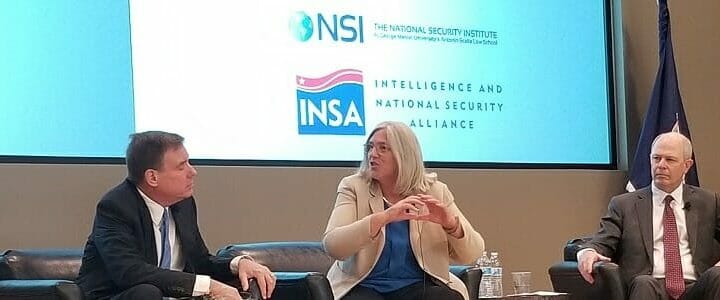“And it’s 600,000 – not 660,000,” said Sue Gordon, Principal Deputy Director of National Intelligence, correcting Senator Mark Warner on the size of the security clearance backlog.
And then came the kicker. “And we think by the spring, with the help of the Department [of Defense] that we’ll be down maybe half that much.”
This prompted Sen. Warner to quip, “So we’ll be at 300,000 by the spring – take it from Sue Gordon!”
This friendly ribbing came yesterday at a panel discussion on Building a 21st Century Trusted Workforce, hosted by the Intelligence and National Security Alliance (INSA) in partnership with the National Security Institute (NSI) of George Mason University. The panel discussion featured Deputy Director Gordon, Vice Chair of the Senate Select Committee on Intelligence Sen. Warner, CEO of ManTech Kevin Phillips, and INSA Chairman Tish Long. The focus? How to overhaul the security clearance process.
understanding The size of the security clearance backlog
For those well-seasoned in the pitfalls and broken promises of the security clearance process, Gordon’s estimate seems aggressive, to say the least. The backlog reached historic heights earlier this year, hovering around 750,000 pending investigations. Built up over years of scandals, security breaches, and transfers of power, wait times in the first quarter of 2018 were averaging a whopping 534 days for Top Secret and 221 days for Secret and Confidential security clearances for DoD industry applicants.
In the most recent quarterly report released by the National Background Investigations Bureau (NBIB), the security clearance backlog was reported at approximately 660,000 investigations. Without a doubt, Gordon is aware of these challenges.
common standards are the key
Perhaps Gordon is depending on a widespread implementation of common standards across all agencies to both manage risk and streamline the clunky, complex investigations process. And she believes those common standards are coming soon.
“I believe we will have, in this coming year, agreed-to standards that are promulgated in a policy document. I do.”
The delays are not merely the result of agencies not pulling their weight, but a lack of common standards against which to measure risk. Right now, agencies are hedging their bets, afraid to take on risks that are not widely accepted by the majority of other agencies. Each agency is dictating their own standards – and this is creating delays.
“What we have to get better at is the accountability for following the standards, and in the understanding of why it is that they’re not [being followed]. I don’t think we have a bunch of agencies that are dilettantes. I believe that everyone’s trying to do the best job for the nation, but once we have the standards we have to work on the accountability of finding [why that is].”
Gordon reiterated, “It’s not willful disobedience – it is about this notion of convincing people that there is a different way that we can understand risk. Give them some tools – we’re already beginning with CE [continuous evaluation]. There are a lot of agencies involved here that don’t all have the resources that we [the intelligence community] do in order to make these happen. Even within the intelligence community that has resources, to get the resources devoted to this new way of dealing with data is the big move.”
Security clearance backlog is “not just a Problem, but a crisis”
Sen. Warner was quick to echo the words of Director of National Intelligence Dan Coats that this security backlog is not just a problem, but a full-blown national security crisis. Throughout the panel, Warner, Phillips, and Gordon emphasized just how excessive wait times are preventing essential positions from being filled. Whatever talent gap already exists in the intelligence field is only being exacerbated by prohibitive security clearance wait times.
“We’re running the risk of not being able to use the talent that we know is existent if we don’t solve this problem,” said Gordon. “And I love both my country and solving problems, so the pressure from these two [Sen. Warner and Tish Long] is welcome, even if it’s vexing. I appreciate your interest – let’s keep the conversation going.”
Gordon seemed both confident and realistic in her estimates; perhaps she knows something we don’t. If that’s the case – and the backlog really does get cut in half – we look forward to eating our words come springtime.




